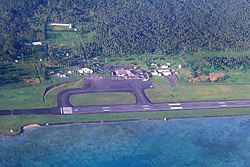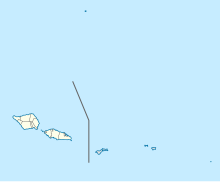Faleolo International Airport
Faleolo International Airport Malae Vaʻalele i Faleolo | |||||||||||
|---|---|---|---|---|---|---|---|---|---|---|---|
 | |||||||||||
| Summary | |||||||||||
| Airport type | Public | ||||||||||
| Serves | Apia, Upolu Island, Samoa | ||||||||||
| Elevation AMSL | 58 ft / 18 m | ||||||||||
| Coordinates | 13°49′47″S 172°00′30″W / 13.82972°S 172.00833°W | ||||||||||
| Maps | |||||||||||
 Apia in Samoa | |||||||||||
 | |||||||||||
| Runways | |||||||||||
| |||||||||||
Faleolo International Airport (IATA: APW, ICAO: NSFA) is an airport located 40 kilometres (25 mi) west of Apia, the capital of Samoa. Until 1984, Faleolo could not accommodate jets larger than a Boeing 737. Services to the United States, Australia, or New Zealand, could only land at Pago Pago International Airport in American Samoa. Since the airport's expansion, most international traffic now uses Faleolo.
History
[edit]Faleolo Airfield
[edit]In 1942 the New Zealand colonial administration took land from the village of Satuimalufilufi for defence purposes, forcing it to relocate.[2] United States Navy SeaBees of 1st Construction Battalion subsequently constructed an airfield and Naval Base Upolu. It became an auxiliary field of U.S. Naval Station Tutuila in the Samoa Defense Group Area[3] during the Pacific War. Faleolo Airfield was completed by the Seabees in July 1942[4] and U.S. Marine Fighting Squadron VMF-111 was moved from Tafuna Airfield to Faleolo Airfield[4] after the aircraft runway was completed to protect the islands of Upolu and Savai'i from an anticipated Japanese invasion.[5] The original runway was 4,000 feet (1,219 m) x 200 feet (61 m) and was extended to 6,000 feet (1,829 m) x 350 feet (107 m) in March 1943 to accommodate a taxiway and space for basing of up to 57 fighter aircraft. Airfield support buildings and two hangars were also constructed and completed in March 1943.
Civilian airport
[edit]After the war the airport was used for flying boats as part of the coral route,[6] but the airstrip itself was little-used.[7] It was upgraded in 1957 to allow the change-over from seaplanes to land-based aircraft.[8] Heavy rain and flooding in 1967 eroded the airstrip and forced it to be closed for three days.[9] The Samoan government subsequently sought a loan from New Zealand and the Asian Development Bank to upgrade it to take heavier aircraft.[10] The upgrade was completed in April 1972, giving a 5,500 feet (1,700 m) sealed runway.[11] The extended airport was capable of handling jets up to the size of a Boeing 737, enabling direct flights to New Zealand.[12] Desire for increased tourism saw it upgraded again over 1984-1985 to enable large jets.[13] It was further upgraded in 2000.[14]
Land claim
[edit]While the land was taken for defence purposes during wartime, it was not returned when the war ended, and was later transferred to the Western Samoa Trust Estates Corporation.[2] This has been contested since Samoan independence in 1962, resulting in ongoing protests and legal action. In 1985, villagers occupied some of the land, resulting in prosecution for trespass.[2] In 1998 villagers slaughtered government cattle and fired on police as part of a dispute over ownership.[15] In 2012, the 50th anniversary of independence, they petitioned for its return,[16][17] stopped survey work,[18] and blocked the road to the airport.[19] In 2018 the Samoan government forcibly relocated families to allow for a further extension to the airport to be constructed.[20]
Facilities
[edit]The airport is at an elevation of 58 feet (18 m) above mean sea level. It has one runway designated 08/26 with an asphalt surface measuring 3,000 by 45 metres (9,843 ft × 148 ft).[21] The Pavement Classification Number for the runway is 058FBXT.[21]
Faleolo Tower has some jurisdiction over the airspace of American Samoa and Tonga as well as its own airspace. It is assisted by the tower at Nadi, Fiji and the whole area is under Oceanic Control from Auckland, New Zealand.[22]
Airlines and destinations
[edit]| Airlines | Destinations |
|---|---|
| Air New Zealand | Auckland |
| Fiji Airways | Honolulu,[23] Nadi |
| Qantas | Brisbane[24] |
| Samoa Airways | Pago Pago, Savai'i[25] |
| Talofa Airways | Nuku'alofa, Pago Pago |
| Virgin Australia | Brisbane |
Accidents and incidents
[edit]- On 11 December 1950 a Royal New Zealand Air Force Consolidated PBY Catalina crashed shortly after takeoff from the lagoon, killing seven people. One crew member and five passengers survived the crash.[26][27]
- On 13 January 1970, Polynesian Airlines Flight 208B, operated by Douglas C-47B 5W-FAC crashed into the sea shortly after take-off on an international non-scheduled passenger flight to Pago Pago International Airport, American Samoa. All 32 people on board were killed.[28][29]
- On 14 September 1994, a Polynesian Airlines Boeing 737-300 operating Flight PH844 from Fuaʻamotu International Airport in Tonga could not extend its undercarriage because of the body of a male stowaway which was jammed in the wheel well. The flight made an emergency landing at Faleolo using only the nosewheel and port undercarriage with minimal damage to the aircraft.[30][31] Eye witness and author Ruperake Petaia wrote The Miracle (1996, 2013)[32] based on a number of passenger accounts of the event.
- In 2000, Air New Zealand flight NZ60 nearly overshot the runway due to a faulty instrument landing system, which had been accidentally damaged by a digger. The pilots took a number of measures to successfully prevent an accident, which were incorporated into a training video. Key points from the video that averted disaster included the pilots' unease about the ILS glideslope capture, the conflict between the aircraft's altitude and the functioning Distance Measuring Equipment, and their familiarity with the approach into Faleolo which caused them to realise they were not where they were supposed to be, had the ILS been functioning correctly. For these reasons they initiated a go around, and used the VOR/DME equipment for the second and successful approach.[33]
See also
[edit]References
[edit]- ^ Airport information for APW at Great Circle Mapper. Source: DAFIF (effective October 2006).
- ^ a b c Western Samoa Trust Estates Corporation v Tuionoula, 1987 WSSC 3 (Supreme Court of Western Samoa 19 January 1987).
- ^ "The U.S. Naval History of the Samoan Defense Group" (PDF). Lt. Commander John Buake, USNA. Archived from the original (PDF) on 25 July 2011. Retrieved 23 February 2011.
- ^ a b "History of U.S. Marine Corps Operations in World War II". Hough, Ludwig, Shaw - Chapter 3: The Southern Lifeline, pg 90. Retrieved 18 February 2011.
- ^ "Building the Navy's Bases in World War II". Department of the Navy Bureau of Yards and Docks, pg 213-214. Retrieved 18 February 2011.
- ^ Michael Field (18 December 2001). "PACIFIC REMEMBERS WHEN FLYING THE "CORAL ROUTE" WAS ROMANTIC". Pacific Islands Report. Retrieved 22 September 2021.
- ^ "A PLANE'S EMERGENCY LANDING IN SAMOA". Pacific Islands Monthly. Vol. XXVI, no. 9. 1 April 1956. p. 19. Retrieved 22 September 2021 – via National Library of Australia.
- ^ "FALEOLO FACELIFT W. Samoa Prepares For Land Planes". Pacific Islands Monthly. Vol. XXVII, no. 7. 1 February 1957. p. 23. Retrieved 22 September 2021 – via National Library of Australia.
- ^ "HEAVY RAIN SHOWS UP SHORTCOMINGS OF APIA'S AIRPORT". Pacific Islands Monthly. Vol. 38, no. 4. 1 April 1967. p. 133. Retrieved 22 September 2021 – via National Library of Australia.
- ^ "In A Nutshell". Pacific Islands Monthly. Vol. 40, no. 3. 1 March 1969. p. 154. Retrieved 22 September 2021 – via National Library of Australia.
- ^ "Western Samoa's short approach to tourist traffic". Pacific Islands Monthly. Vol. 43, no. 5. 1 May 1972. p. 94. Retrieved 22 September 2021 – via National Library of Australia.
- ^ "THE SAMOAS Continental means pluses and minuses". Pacific Islands Monthly. Vol. 50, no. 7. 1 July 1979. p. 48-49. Retrieved 22 September 2021 – via National Library of Australia.
- ^ "Longer runway planned for Faleolo". Pacific Islands Monthly. Vol. 56, no. 5. 1 May 1985. p. 33. Retrieved 22 September 2021 – via National Library of Australia.
- ^ "SAMOA'S UPGRADED AIRPORT WILL ATTRACT MORE TOURISTS, SAYS PM TUILAEPA AT OPENING". Pacific Islands Report. 13 October 2000. Retrieved 22 September 2021.
- ^ "ANGRY SAMOAN VILLAGERS FIRE AT POLICE". Pacific Islands Report. 23 June 1998. Retrieved 22 September 2021.
- ^ "Satapuala Village Petitions Samoa Government To Return Lands". Pacific islands Report. 1 June 2012. Retrieved 22 September 2021.
- ^ Michael Morrah (2 June 2012). "Samoan village battles land claim". Newshub. Archived from the original on September 22, 2021. Retrieved 22 September 2021.
- ^ "Samoa Police Increase Security For Land Survey Near Airport". Pacific islands Report. 16 July 2012. Retrieved 22 September 2021.
- ^ "Villagers block road in Samoa". New Zealand Herald. 18 August 2012. Retrieved 22 September 2021.
- ^ Joyetter Feagaimaali’i-Luamanu (12 April 2018). "Police called, workers allegedly threatened". Samoa Observer. Retrieved 22 September 2021.
- ^ a b Airport information for NSFA[usurped] from DAFIF (effective October 2006)
- ^ "Our work in the South Pacific". Airways NZ. Retrieved 24 August 2021.
- ^ "New Samoa-Honolulu flights planned". Pacific Business News. 2009-08-03. Retrieved 2009-08-03.
- ^ "Qantas resumes Australia flights". Retrieved 18 August 2022.
- ^ Liu, Jim. "Samoa Airways resumes Apia – Savai'i from late-August 2020". Routesonline. Retrieved 21 August 2020.
- ^ "CATALINA LOST 7 Killed in Crash in W. Samoa". Pacific Islands Monthly. Vol. XXI, no. 5. 1 December 1950. p. 6. Retrieved 22 September 2021 – via National Library of Australia.
- ^ "SAMOAN AIR DISASTER Cause Still Unknown". Pacific Islands Monthly. Vol. XXI, no. 6. 1 January 1951. p. 28. Retrieved 22 September 2021 – via National Library of Australia.
- ^ "5W-FAC Accident description". Aviation Safety Network. Retrieved 11 October 2010.
- ^ "All 30 Aboard DC-3 Die In Air Crash in Samoa". New York Times. 14 January 1970. Retrieved 5 August 2021.
- ^ "Dead Stowaway Found After Emergency Landing". Los Angeles Times. 15 September 1994. Retrieved 5 October 2021.
- ^ "W.Samoa haunts Tonga over dead stowaway". Pacific Islands Monthly. Vol. 64, no. 12. 1 December 1994. p. 8. Retrieved 5 October 2021 – via National Library of Australia.
- ^ Petaia, Ruperake (2013). The Miracle. Ruperake Petaia. ISBN 9781301251636.
- ^ "NZ60 Erronious (sic) ILS Incident, Apia". YouTube. 2006-12-22. Archived from the original on 2021-12-18. Retrieved 2009-09-30.



